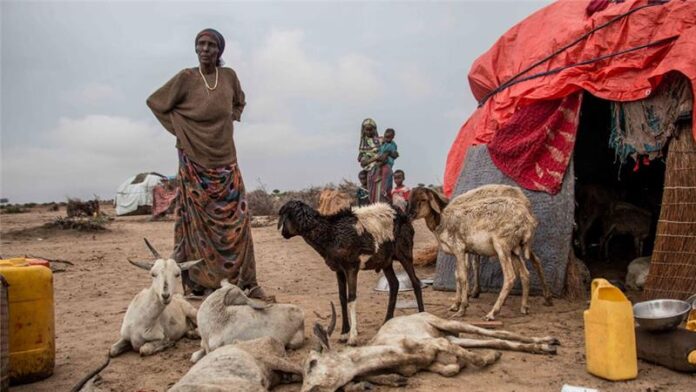Muqdisho (Kaab TV) – The Horn of Africa region is facing a dire humanitarian emergency, with Somalia at the forefront of this crisis. The country is grappling with the worst drought in recorded history, which has resulted from five consecutive failed rainy seasons.
The United Nations (U.N.) has issued an urgent appeal for $2.6 billion in aid to help the 7.6 million most vulnerable individuals who are facing acute hunger, conflict, skyrocketing food prices, and the devastating effects of the drought.
The U.N. warns that famine is a distinct possibility in the coming months unless the necessary humanitarian assistance is provided and sustained.
The extent of the crisis
The U.N. warns that nearly 6.4 million individuals are already facing food insecurity, with the number expected to increase to 8.3 million between April and June. This includes 727,000 who will experience catastrophic hunger levels.
Those at the highest risk are in the Baidoa and Burhakaba districts and displaced populations in the Bay Region and Mogadishu. Furthermore, several areas and population groups in central and southern Somalia are also at risk of famine.
The U.N. warns that the distinction between a declared famine and the situation millions of Somalis face is “truly meaningless,” as children are already dying of starvation.
The forecast for the upcoming rainy season is bleak, and the country is in its fifth failed rainy season.
The impact of climate change
The Horn of Africa is getting hotter and drier due to the impacts of climate change, and the U.N. estimates that at least 36.4 million individuals across the region need emergency aid to survive.
In Somalia alone, more than 1.4 million individuals have been displaced, and over 3.5 million livestock have died, destroying livelihoods and reducing children’s access to milk.
The consequence of inadequate aid
Hunger is set to increase, and as funding for humanitarian assistance dwindles, 8.3 million Somalis will likely face high levels of acute food insecurity, including over 727,000 who will face catastrophic conditions.
Around eight million individuals in Somalia do not have access to safe water, sanitation, or hygiene services, which has led to a surge in cholera and measles cases, along with a rise in acute malnutrition.
Conflict and insecurity continue to pose significant challenges, driving needs and hampering humanitarian access.
The need for immediate action
The U.N. stresses that in addition to providing immediate aid, investing in livelihoods, resilience, infrastructure development, climate adaptation, and durable solutions is essential to break the cycle of chronic and recurrent drought.
The Federal and State governments, local communities, the Somali private sector, and the diaspora are working with the international community to assist the most vulnerable. The U.N. is calling on all partners to support these life-saving efforts.
The importance of donor support
Last year, aid organizations, local communities, and government authorities made significant efforts to respond to the crisis, reaching 7.3 million individuals. However, additional resources and unhindered access to those in need are desperately needed.
The U.N. Humanitarian Coordinator is also appealing for more donors to “step up and frontload their support,” warning that any delay in assistance could mean the difference between life and death.
The U.N. urges donors to act quickly and fulfill the promise made after the 2011 famine that “never again” would such a tragedy be allowed to occur.
The situation in Somalia is highly dire, and prolonged and extreme conditions have led to higher-than-normal deaths, even though the technical famine thresholds have not been reached.


